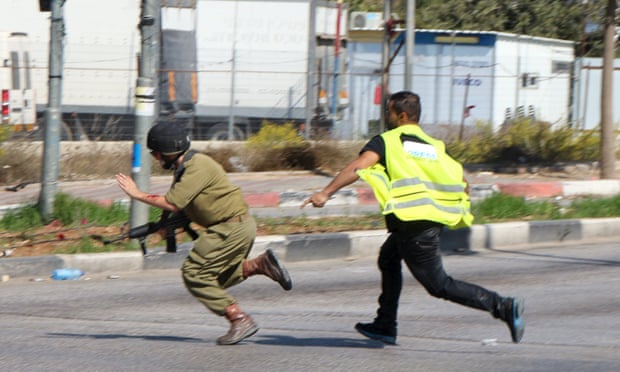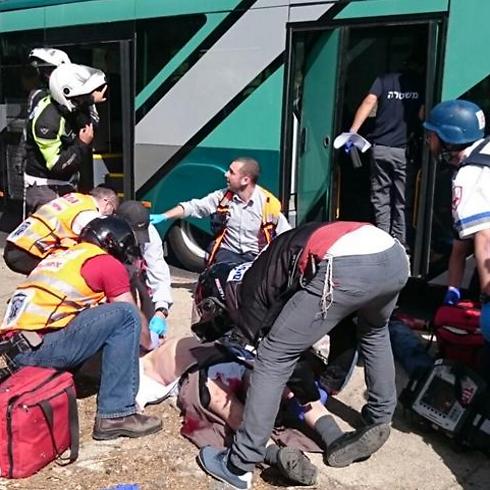The knife intifada

A Palestinian posing as a journalist chases an Israeli soldier after stabbing him, near Hebron on Friday. Moments later he was shot dead. Photo by Bilal al-Taweel/Reuters
What’s driving the young lone wolves who are stalking the streets of Israel?
Unlike previous uprisings, the youths launching deadly assaults on Israelis are acting alone, often linked only by social media
By Peter Beaumont, Observer
October 18, 2015
The last moments of Mohammed Ali’s life provide few clues to his motivation. He is barely visible at first in the video footage taken outside the Damascus Gate of the Old City, sitting against a wall next to a group of Israeli border police in their grey uniforms. The police seem relaxed, chatting to each other, as a Palestinian porter pushes a red crate past them on a handcart.
One of the policemen walks to where Ali, 19, is sitting and seems to ask him something. He stands abruptly, visible at last in a blue hooded top. The policeman seems to push him back down and another steps in close. The policeman appears to check a document and Ali shifts where he is sitting, reaching for something tucked into the band of his jeans. When he stands again, he has pulled out a knife and tries to stab one of the policemen in the head before being shot dead. The encounter lasts a minute.
The suddenness of the confrontation eight days ago is emblematic of a key aspect of the violence that has engulfed Israelis and Palestinians in the past two weeks. Videos and eyewitness accounts again and again depict a similar event: a surprising assault with a sharp or edged object – knife, meat cleaver or screwdriver – followed often within a handful of seconds by a return of fire from Israeli police, security guards or soldiers.
In the latest incidents, three Palestinians were shot dead on Saturday in what Israel said were thwarted knife attacks, although a Palestinian witness of one clash said it was a result of Jewish settler violence.
How violence plays out in conflict –the weapons used, how attacks are executed and organised and who takes part and against what targets – are indicative of more than simply the act of killing or attempted killing. While the first Palestinian intifada was defined in the popular imagination as the “stone-throwing intifada” and the second as a conflict of suicide bombings and gun attacks, the new surge in violence has been so closely associated with knife attacks that on social media some have dubbed it the “knife intifada”.
At the entrance to the Shuafat refugee camp in East Jerusalem where Ali lived, three burned-out, overturned cars – part of a recent barricade – lie facing the Israeli police at the checkpoint in the wall that seals off the camp. The house where Ali’s male relatives are sitting in mourning is deep within the camp’s narrow lanes. They have not yet received his body for burial. His uncles, Assad Mohammed Ali and Mahmoud, tell a story familiar to those who have done these rounds of questioning before. Their nephew, they say, was a popular and happy youth. He had no problems – except he was angry at the Israeli occupation, and in particular at Israeli actions around the flashpoint religious site of the al-Aqsa mosque. So far, so familiar.
“We have a new generation,” another relative standing on a stairs above the uncles interjects, unwilling to be identified. “They are smart and clever. They can’t sustain the humiliation. They think: if you are going to kill us in the end, we should attack first. You have to understand that this generation is well educated. It is well informed and globalised. They can’t be fooled, like we were fooled in the old days. They have their own way of finding out what is going on. Social media and the internet are educating them.”
Asked about why this episode is different from the first and second intifadas, in the weapons of choice and the organisation or lack of it, Assad Mohammed Ali says: “This is a pure intifada. It is pure because it is about individuals’ personal motivation. They are the ones who sparked it.” The other uncle adds: “The last ones were political. This is not political; it is spontaneous.”
Assad Mohammed Ali adds that, confronted with what has been happening at al-Aqsa – with the fatal shootings of Palestinian teenagers – “kids started carrying knives” and his nephew was among them. He suggests a widespread and fatalistic anticipation of death. “When a person thinks death may be imposed, then he wants to die in a heroic way.” He mentions two men from the camp who were killed last year. “The new generation wants to try and imitate them.”
Their depiction of a demotic violent resistance that is spontaneous and unorganised, and with imitative elements, reflects assessments by many in Israel’s security establishment and by statements posted online by some attackers.
Comments by the likes of the Israeli prime minister Binyamin Netanyahu and his senior figures blaming Palestinian social media “incitement” have misunderstood a phenomenon that is much like a viral meme and has seen decisions to take part more akin to behaviour seen in the Arab spring than to intifadas directed by Palestinian factions.
That view was reflected in a recent opinion article in the Jerusalem Post written by Lior Akerman, a former brigadier-general who served in the Israeli domestic security agency, the Shin Bet. “These types of terrorist attacks cannot be detected ahead of time,” Akerman argued, “as there is no planning or strategy behind them. As a result, the security forces have no way of preventing them … When lone-wolf attacks succeed, other individuals think to themselves: ‘Hey, I can do that too’.”
In other ways, the use of knives in recent attacks is a function of the lack of organisation and backing by Palestinian factions for an armed intifada, at the instruction of the Palestinian security forces of President Mahmoud Abbas. Largely lacking access to firearms, those carrying out attacks have used as weapons what is most easily available – knives and vehicles. The result has been an asymmetry in not only weapons but organisation, which has left politicians and security forces without a clear and identifiable opponent distinguishable from the wider Palestinian population.

Scene of the attack on a bus, East Talpiot, Jerusalem, Tuesday October 13th. Photo by Shlomi Cohen.
Those dynamics were spelled out explicitly by Baha Allyan, 22, one of two young men involved in the lethal attack on a number 78 bus of the Egged company, on Tuesday in Armon Hanetziv, which claimed the lives of two Israelis, before he was killed. Although Allyan was identified in the Israeli media as having been imprisoned for past activities related to Fatah, in a list of things he wanted to be done after his death, posted on Facebook, he insisted: “I ask that the political parties do not claim responsibility for my attack. My death was for my nation and not for you.”
Echoing the comments of Ali’s uncles, Allyan’s posts – including on the weekend before his attack – made it clear that he not only distrusted mainstream media accounts of what was happening, and the Palestinian political leadership, but was also active in disseminating what he believed to be the truth. “I am posting news on my [Facebook] page due to the absence of real media, and also to refute Hebrew media which some consider credible but is certainly not,” wrote Allyan at the weekend. “Without real media our truth will be lost.”
And if there is an element of imitation – a desire to emulate, as Ali’s uncles argue, taken up by social media postings – some of that has been inspired by the actions of 19-year-old Muhanad Halabi, whose stabbing of Israelis – including Rabbi Nehemia Lavie and Aharon Bennett who died – in Jerusalem’s Old City two weeks ago appears as much as anything to have served as trigger.
In his home in a village outside al-Bireh on the West Bank, his family sits with necklaces bearing his image. As I sit with them, a coachload of women arrives from the Mourabitat – the volunteer Islamic watch group from al-Aqsa mosque whose banning by Israel contributed to the flaring-up of recent tensions.
“He was part of a younger generation,” his father, Shafiq, says. “He wasn’t satisfied with the situation either on al-Aqsa or the way they treat our women. He was religious and he was studying law because he wanted to defend those he felt were oppressed. He spoke of doing a degree in Islamic studies and his PhD.
“I used to think, when I saw him and his friends spending so much time on Facebook, that you are the generation that gave up hope, but he proved me wrong. He showed that they are different. They are the generation that will change things.”
I ask him the question about knives. “We are people who feel solid in our rights, but we have no force. Our only tool is our hands and nails. That is what transforms a child into a strong man.”
Shafiq is asked what he would have done had he known what his son would do. “If I could turn back time, of course I would prevent him from doing it. Do you think I would want him to die?”
